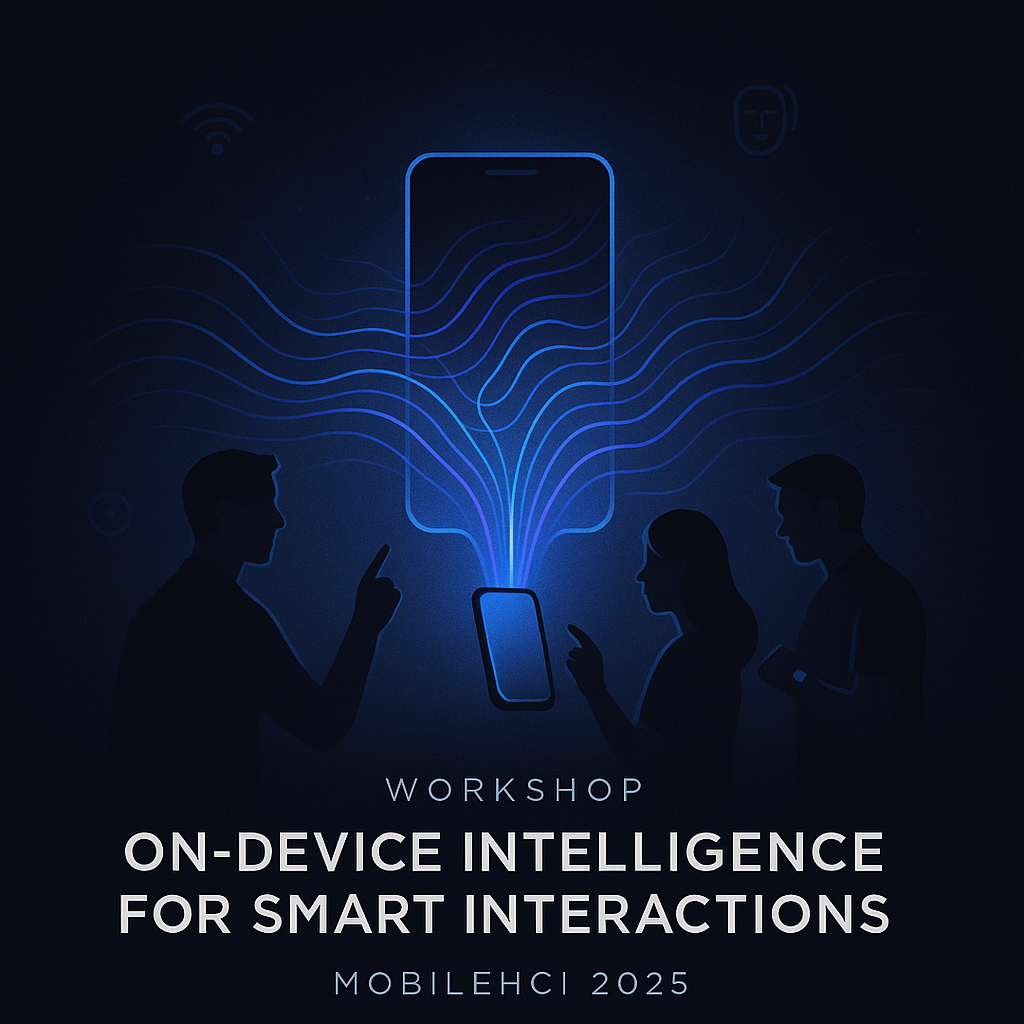
About the workshop
As interactive technology increasingly shifts towards more seamless and natural user experiences, there is a growing need for adaptive and responsive interactions that can intuitively react to user behavior and environmental changes. Embedded AI, which enables real-time, on-device processing, plays a crucial role in achieving this by reducing latency, enhancing privacy, and ensuring continuous functionality even in offline scenarios. Meanwhile, smart textiles offer a novel and versatile input modality, allowing for richer interaction through touch, motion, and physiological sensing. The ODISI workshop explores the integration of these technologies, focusing on deploying AI models on resource-constrained devices such as microcontrollers, smartphones, and smartwatches. By combining embedded AI with smart textiles, this workshop aims to advance research in real-time adaptive interfaces, covering key topics such as AI deployment strategies, innovative sensor integration, design considerations, efficient processing pipelines, and ethical concerns. Featuring interactive presentations, hands-on tutorials, and collaborative activities, this full-day event will foster new insights and developments in AI-driven wearable and mobile interactions.
Agenda
| Duration | Activity |
|---|---|
| 15 min | Welcome and icebreaker introductions |
| 20 min | Opening keynote |
| 60 min | Presentations of papers and discussion |
| 20 min | Collaborative activity 1: brainstorm future research and paper ideas |
| 60 min | Hands-on Tutorial 1: SI – smart interaction |
| 30 min | Collaborative activity 2: Develop smart interactive system concepts |
| 60 min | Hands-on Tutorial 2: ODI – on-device intelligence |
| 90 min | Collaborative activity 3: Develop ODISI systems prototypes |
| 20 min | Presentation and interactive demo, discussion and feedbacks |
| 15 min | Reflections and closing remarks |
Tutorial 1: Smart Interactions – interfacing sensor/actuator modules with mobile and embedded controllers
Tutorial 2: on-device intelligence – training and deploying customized AI models on mobile and embedded processors
Collaboration 1: brainstorm future research and paper ideas
Collaboration 2: develop smart interactive system concepts
Collaboration 3: develop prototypes of the ODISI systems, with accumulative takeaways from both tutorials
Keynote talks TBA
Papers TBA
Call For Papers
The On-Device Intelligence for Smart Interactions Workshop aims to explore the deployment of AI models directly onto embedded processors found in devices like microcontrollers, smartphones, and smartwatches. This on-device processing facilitates real-time data handling, reduces latency, and bolsters user privacy by eliminating the need for cloud-based computations. The workshop seeks to investigate novel input modalities that can revolutionize user interactions with mobile devices.
Key topics include but not limited to:
- Deployment Techniques:
- Strategies for optimizing and implementing AI models on resource-constrained devices
- AI inference on microcontrollers
- Hardware acceleration for low-power, real-time inference on wearables and IoT devices
- Energy-efficient AI architectures tailored for mobile and wearable devices
- Interaction Paradigms
- Integration of sensors in textiles for interaction (e.g. capacitive sensing)
- Gesture and motion sensing through e-textiles and flexible electronics
- Muscle activity, and physiological sensing (e.g. through Bio-Impedance) for wearable AI applications
- Adaptive and context-aware textile interfaces for mobile devices
- Tangible interaction for sensing and actuation (e.g. haptics)
- Design Innovations:
- User-centric design approaches for wearables and on-device AI
- Evaluating the usability, ergonomics, and interaction quality of AI-driven smart inputs
- Human factors and the cognitive load of wearable and textile-based interfaces
- Efficient Pipelines:
- Optimizing the pipeline from sensor input to AI-based predictions with a focus on latency and usability
- Low-power, event-driven AI models for continuous sensing and real-time feedback
- Ethical and Privacy Considerations:
- Ethical considerations of deploying AI at the edge, including bias mitigation and fairness.
- Privacy-preserving AI techniques for wearable applications.
- Security risks and opportunities for on-device AI models and sensor data.
- User trust in AI-driven feedback from wearables
Submissions should be concise, in the form of full or short papers:
- Full papers (up to 6 pages) should report reasonably mature work within the scope of ODISI and are expected to demonstrate concrete and reproducible results.
- Short papers (up to 3 pages) are encouraged to report novel and creative ideas that are yet to produce concrete research results but are at a stage where community feedback would be useful.
Submission Instructions
Deadline for submissions: July 21, 2025 August 4, 2025
Notifications of acceptance: August 8, 2025
Submission Link: EasyChair
Submissions should follow the ACM Master Article Templates documentclass[sigconf]{acmart}.
Contact
For any inquiries regarding the workshop, please feel free to contact us: odisi.mhci25@gmail.com
Organizers
Bo Zhou
DFKI & RPTU
Passant Elagroudy
DFKI & RPTU
Paul Lukowicz
DFKI & RPTU
Daniel Geißler
DFKI & RPTU
Mengxi Liu
DFKI & RPTU
Sizhen Bian
DFKI & RPTU
David Cuartielles
Malmo University & Arduino
Felix Dietz
UniBw & LMU
Oliver Hein
UniBw & LMU

